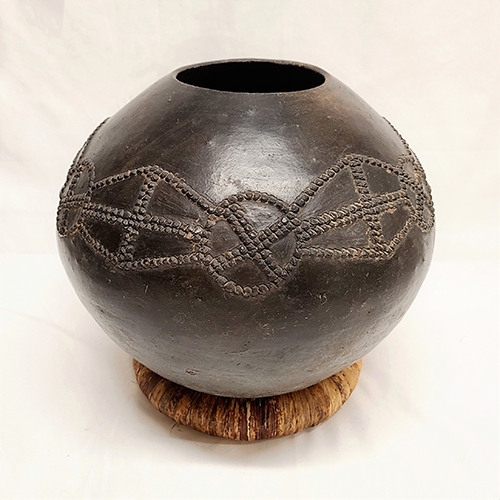Zulu Beer Pot

This beer pot was made by a Zulu potter from South Africa. For the Zulu, pottery is a woman’s art form passed down from mother to daughter. Archaeological evidence shows that the ancestors of the Zulu are started making pottery around 1000 years ago.
Ceramic vessels have a wide range of uses, but they are especially important for brewing and serving sorghum beer called utshwala. This beer has been made in the Zulu region for at least a millennium and is still important in Zulu life today. This type of pot is known as ukhamba and is used as a communal drinking vessel. There are other styles of pots used for brewing, storage, and transportation of beer. The pots are constructed with terracotta coils wrapped around a flat base, which are smoothed to create very thin walls. They have no lip or foot. The pots are fired twice and rubbed with wax or animal fat to create the burnished black appearance. Ukhamba are embellished with incised patterns or raised designs called amasumpa, meaning “warts,” like this one. The patterns serve as both decoration and as a way to better grip the pot while drinking.
The Zulu believe that utshwala is the food of the ancestors, who enjoy to the smell. The black color of the beer pots is also intended to please the ancestors, who are drawn to darkness and quiet. In addition to making the pots, women also brew the beer from a mix of sorghum and maize, creating a nutritious drink with a relatively low alcohol content. Utshwala an important part of hospitality when entertaining. It is also served at events such as weddings, funerals, and other celebrations and rituals. Traditionally, a drink is offered to the ancestors first, and then a pot like this one is passed around from person to person. This communal drinking emphasizes the interconnectedness of humanity.

